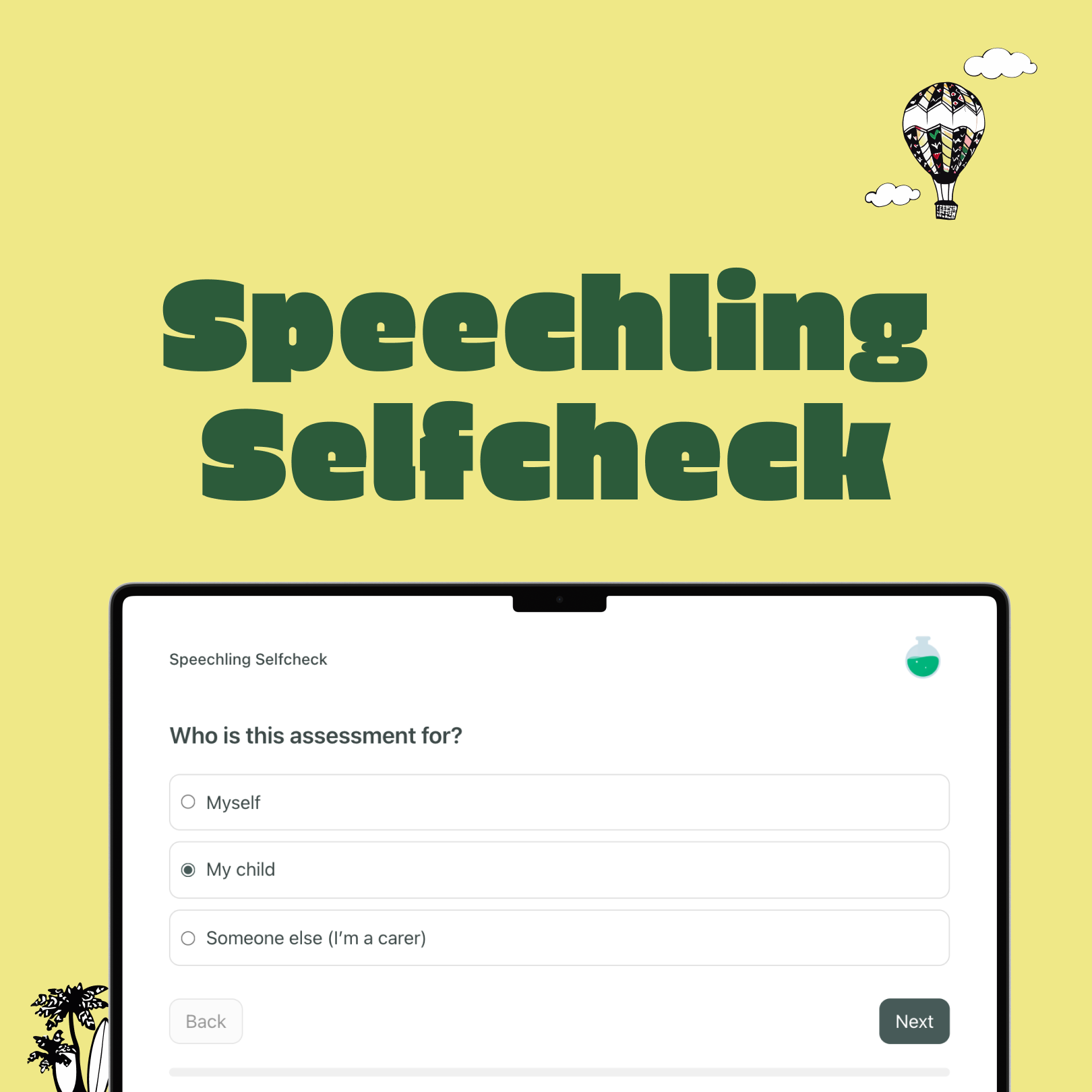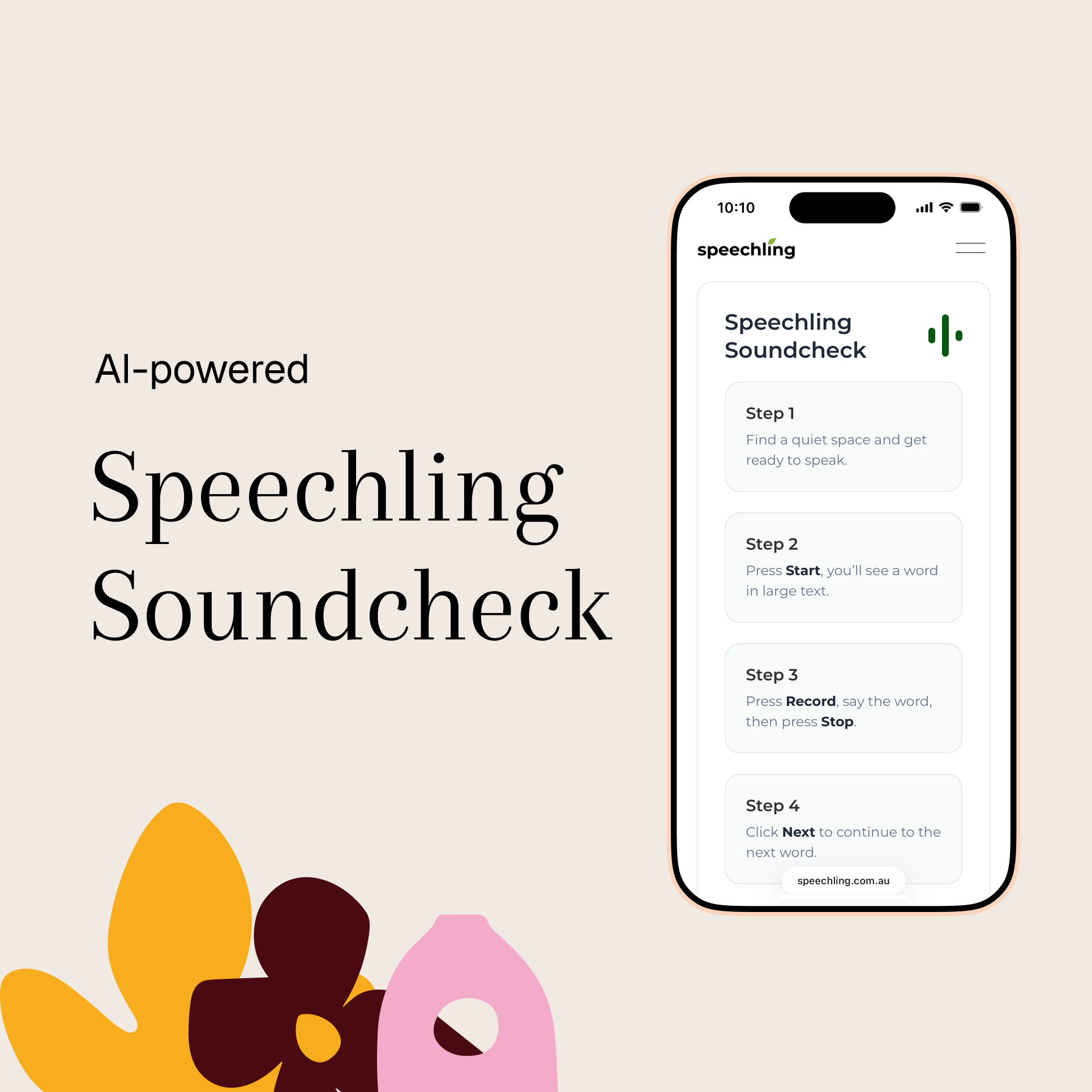
Speech Pathology Insights, Tips and Resources
Meet Speechling Selfcheck
Speechling Selfcheck is a free, 5–7 minute online speech and language screener for yourself, your child, or someone you care for. Answer simple multiple-choice questions (with audio support) and get instant results you can save or print - a clear first step when you’re unsure if support is needed.
Meet Speechling Soundcheck
Speechling Soundcheck is our free, AI-powered speech-sound error screener designed to be quick, simple, and helpful for families and educators. In just a few minutes, it screens for four common phonological processes—fronting, gliding, depalatalisation, and final consonant deletion—and provides instant results to guide your next steps.
True or False: Impact Through Communication
Celebrating Speech Pathology Week 2025. This year’s theme is Impact Through Communication, because communication shapes learning, relationships, and wellbeing. Learn some surprising facts about language development, stuttering, voice, bilingualism and more.
You Asked, We Answered: Speech Pathology FAQs
Got questions about speech therapy? You're not alone.
In our day-to-day work, we hear many of the same questions from curious, thoughtful families and individuals. So we’ve gathered some of the most frequently asked questions we receive—along with answers to help you feel more informed and confident. Whether you're wondering about timelines, what therapy looks like at home, or whether your child’s communication is on track, you just might find the answers you've been looking for. Let’s dive in.
15 Best Speech Apps in 2025
As Speech Pathologists, we get to work with people with various communication difficulties, from speech sounds and language challenges to voice disorders, and social communication skills. So naturally, my team and I have tested out a lot of apps along the way to see what actually makes a difference.
We share 15 of our top picks and why we love each one.
Beyond Words: Supporting people with ADHD and Autism
Speech pathologists can tailor therapy to meet the unique needs of both ADHD and autistic individuals. Whether it’s incorporating new experiences for novelty-seekers or building routines for those who prefer structure, therapy can support engagement, language goals, and social communication. Learn how we adapt approaches based on interests, behaviours, and communication styles.
Voice under the weather - Q&A
Noticing changes in your voice as the seasons shift? From roughness and tightness to fatigue, your voice may be reacting to illness, irritation, or overuse. Learn why these changes happen and discover simple tips to care for your voice — and when to seek help from a speech pathologist.
Back to School, Back to Bed
Sleep plays a powerful role in how children communicate. From clearer speech to stronger language skills and better social interactions, being well-rested helps kids thrive. A tired child may struggle to express themselves or make connections between words and ideas. The good news? Small changes to bedtime routines — like reducing screen time, dimming lights, and setting consistent sleep schedules — can make a big difference.
Patience, in communication, is a virtue
Patience plays a vital role in supporting communication, especially for individuals with speech or language difficulties. In a world that moves quickly, it’s easy to rush conversations or fill silences. However, giving someone time to process and respond can build confidence and reduce pressure. At Speechling, we see patience as an active form of support—one that fosters trust, understanding, and independence. Whether you're a parent, educator, or therapist, allowing space in conversations can empower those learning to communicate. This blog explores the importance of patience and how small pauses can lead to meaningful progress in communication.
You’re a Speech Pathologist?
When someone hears “speech pathologist,” they often think we just help kids pronounce words. But our role is much broader. Speech Pathologists support people of all ages with challenges in communication, language, social interaction, swallowing, voice, and more. We work in schools, hospitals, aged care, homes, and communities—empowering individuals to express themselves and engage fully in life. This blog sheds light on the diverse and impactful work speech pathologists do every day, breaking down common misconceptions and celebrating the depth of our profession. If you’ve ever asked, “What does a speech pathologist really do?”—this one’s for you.










